Who knows it feels it: legislative theatre at INC-3
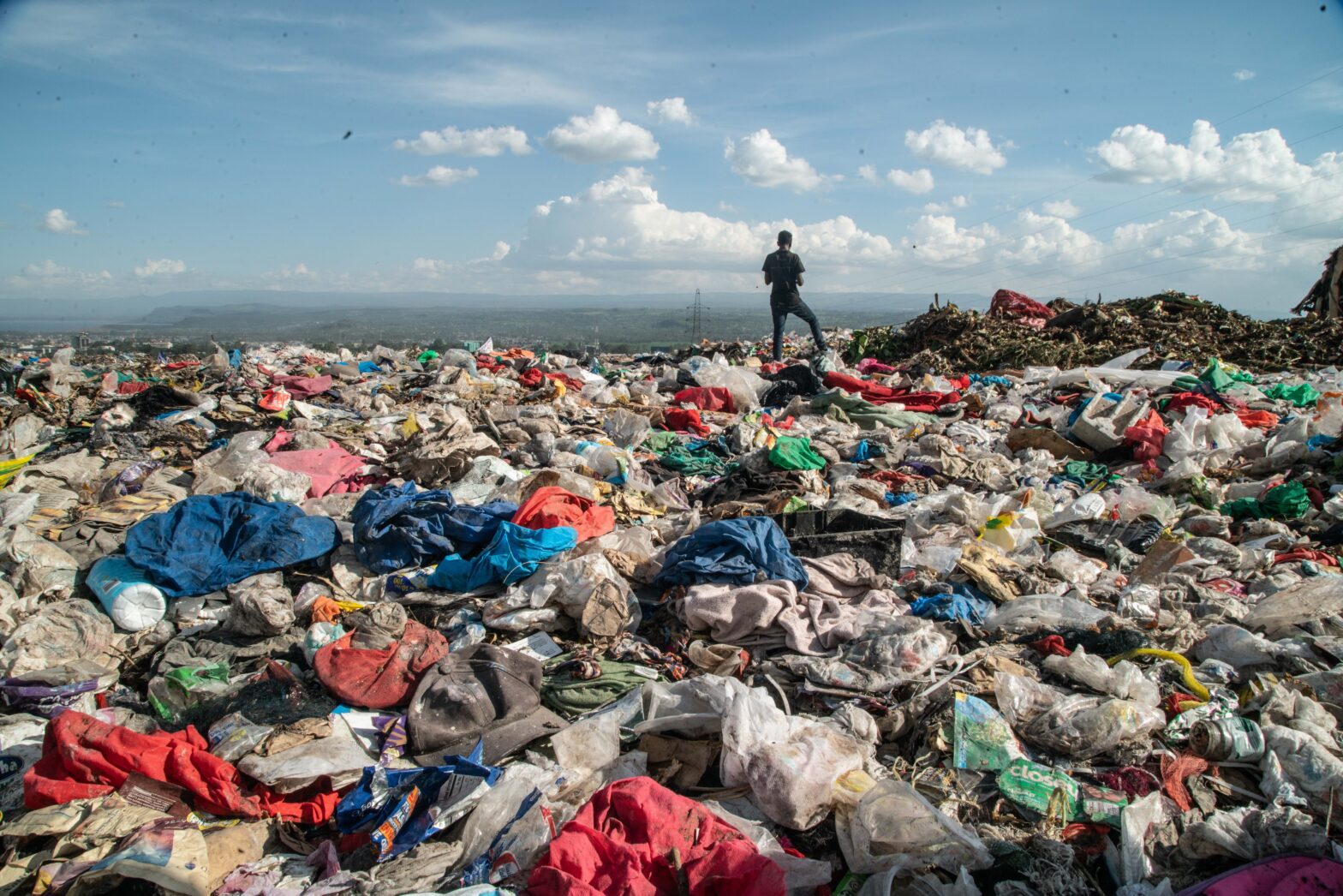
Photo by James Wakibia.
15 December 2023
Waste pickers from Kenya delivered a powerful and unique message to policymakers at the beginning of the third round of plastics treaty negotiations in Nairobi, inviting delegates and observers to experience the everyday life of waste pickers.
Amplifying the voices of waste pickers
“We had a message to deliver and we delivered it.”
Esther Muthoni, one of the waste pickers and actors in the performance
As a side event of the third round of meetings to develop a global treaty to end plastic pollution (INC-3) in November 2023, a team of theatre experts and waste pickers co-created six short pieces of interactive ‘Legislative Theatre’. The scenes were designed to showcase the vast amount of shared knowledge waste pickers have alongside the struggles they face in the face of systemic and institutional discrimination and ignorance. The theatre was performed to policy and decision makers attending the INC-3.
The play was developed during a five-day workshop, taking place in Nairobi just prior to INC-3. The team comprised creative arts experts Dr Cressida Bowyer and Dr Erika Hughes from the University of Portsmouth; Theatre for Development specialist Matthew Hahn; John Chweya and 12 waste pickers from the Kenyan National Waste Pickers Welfare Association; and three theatre directors from the Social Justice Centre Travelling Theatre, Nairobi.
The six pieces of theatre covered topics such as fair pay, discrimination, health and safety concerns, collective knowledge, and status and hierarchy. The topics were chosen as the most pressing by the waste pickers to show in front of an audience of policy-makers.
The theatre was performed four times: once to waste pickers at the Dandora dumpsite in Nairobi, one of the largest dumpsites in East Africa; and three times to an invited audience including delegates attending INC-3 – in total around 700 people.
What is Legislative Theatre?
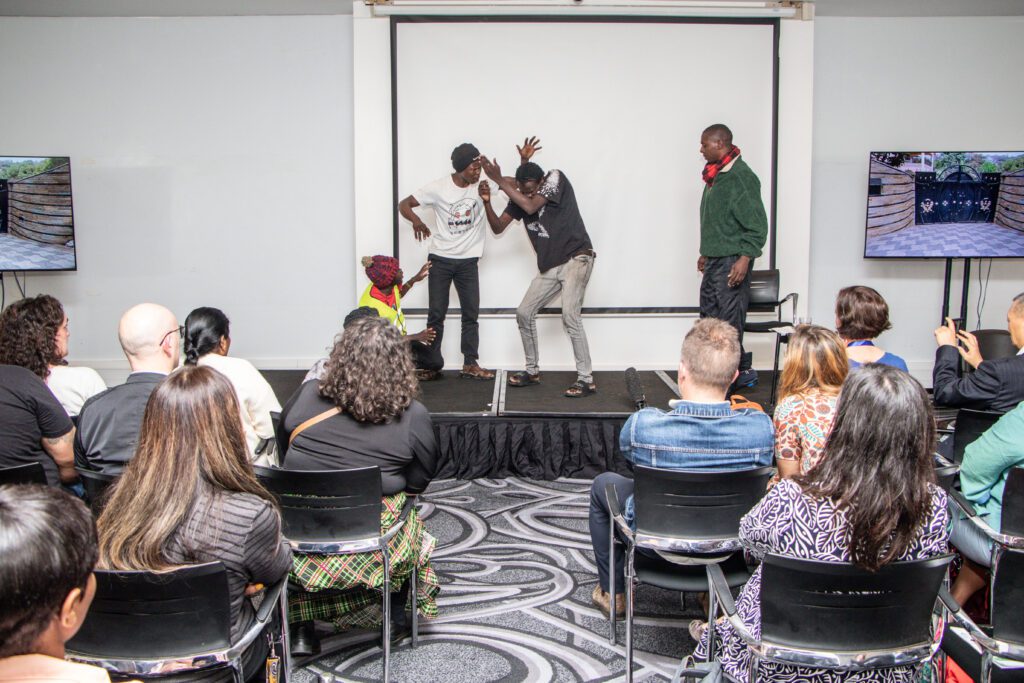
Legislative Theatre is a further development of Forum Theatre with the key difference being the audiences: in Forum Theatre, the theatre piece is created by and for the community that faces the difficulties presented in the piece. In Legislative Theatre, the audience of the theatre piece consists of policy makers, business owners, political leaders and others who can affect systemic and institutional change.
In both, a short play is created which ‘ends badly’ for the main character. The play is then ‘rewound’ and the audience is asked to come up on stage, as the main character, to try out other, more positive, strategies in order to have a different outcome. In this way, the actors and the audience ‘rehearse life’ within the safety of ‘play acting’.
“It is not the place of the theatre to show the correct path, but only to offer the means by which all possible paths may be examined.”
Augusto Boal, father of Legislative of Theatre
Legislative Theatre gets audience members, who often have little or no experience of the difficulty faced within the piece of theatre, to take on the role of the main character where actioning ideas that may sound good whilst sitting passively in the audience run head on into the realities shown within the theatre piece.
Legislative Theatre aims to find alternatives to what actually happened in a challenging situation and seek the support from those in power who could help change the current dynamic. The driving question posed in this piece of Legislative Theatre was ‘What could those in power do to support those whose voices are not often heard?’
Why is this relevant to plastic policy and the Global Plastics Treaty?
“Just transition cannot remain a concept, a shiny word that delegates agitate in front of the cameras at INC meetings. For waste pickers, it’s a matter of life and death, and it must be turned into action at all levels, all over the world.”
John Chweya, Kenyan National Waste Pickers Welfare Association
Numbering over 20 million worldwide, waste pickers are responsible for recovering around 60% of post-consumer plastic waste globally. Challenges for waste pickers include poor and unregulated rates of pay, exposure to health hazards, and low social standing. Importantly, waste pickers are excluded from decision making processes that directly affect their livelihoods. Although waste pickers have now been recognised as formal stakeholders in the treaty process, with emphasis being placed on ensuring a just transition for the informal waste sector, access and inclusion in treaty dialogues is not equitable. More needs to be done to ensure meaningful participation for waste pickers in shaping their future.
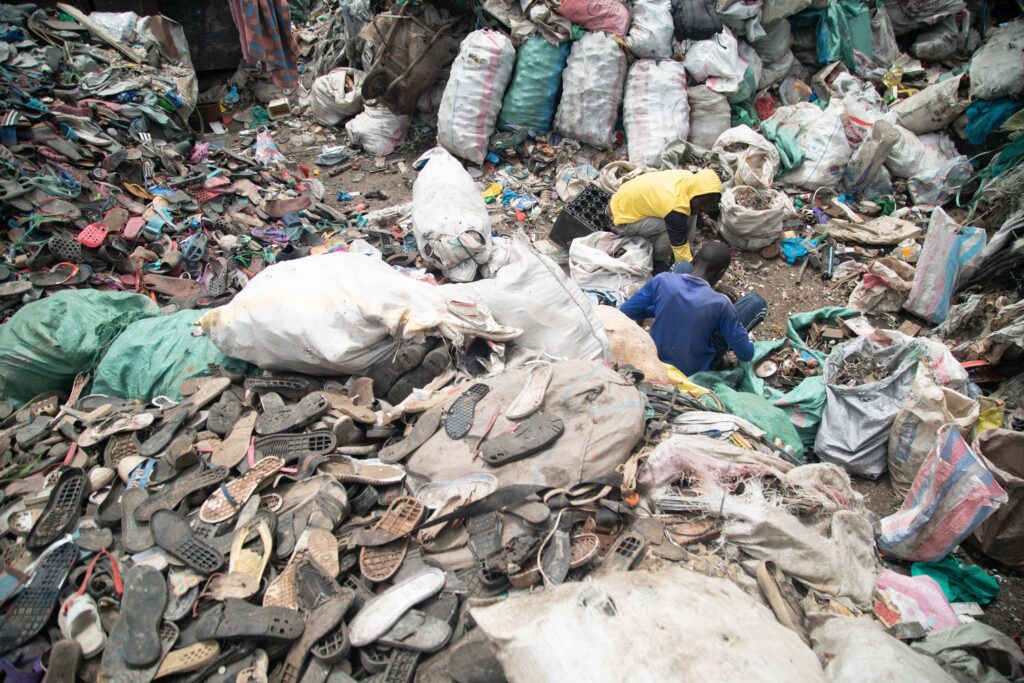
We sought to use Legislative Theatre to amplify the voices of waste pickers and bring the lived experience of waste pickers to the policy- and decision-makers who have the power to bring about systemic change. Waste pickers took their challenges to the heart of negotiations, offering a dramatic insight into the difficulties they face and advocating for recognition, integration and inclusion in the global treaty process and associated outcomes.
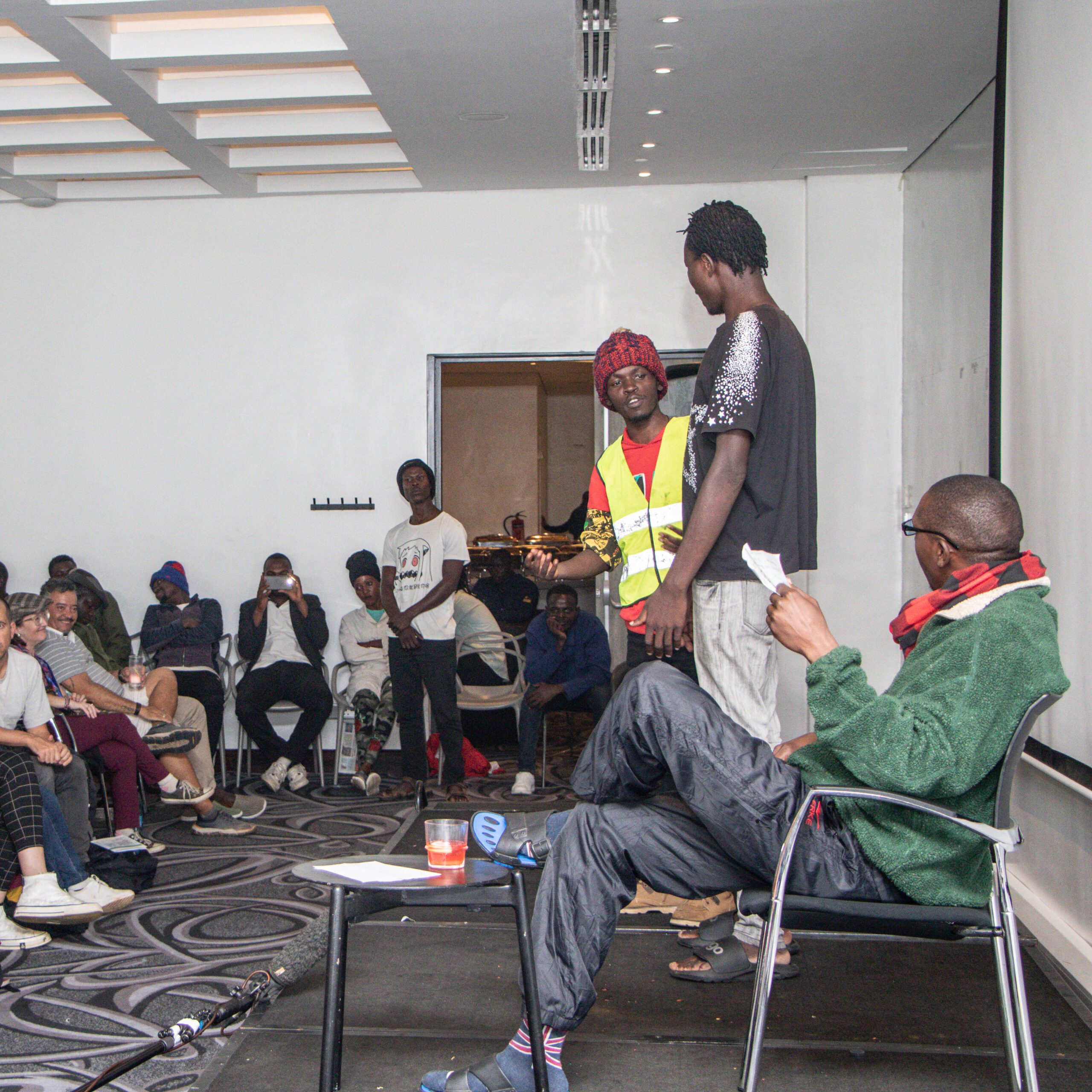
The theatre performance served as a powerful and innovative way to communicate the challenges faced by waste pickers directly to policymakers, and offered a unique opportunity to interact and gain insights into the daily challenges waste pickers encounter. The audience had the opportunity to ‘step into the shoes’ of the waste pickers as they attempted to navigate their everyday working lives in managing plastic. Furthermore, it provided a platform for deliberating on a fair and equitable path forward. By taking on the role of the waste picker, audiences begin to appreciate how difficult actioning ideas on the ground might be.
Based on feedback from national delegations, industry representatives, scientists and international waste picker organisations who attended the performances during INC-3, the performance engendered a deeper understanding and consideration of waste pickers, providing policy-makers with food for thought on how best to advocate for inclusive and just transitions within the global plastics treaty process.
“Thank you for carrying out such inspiring work. I felt immersed in the daily life and struggles of waste pickers in Kenya. This type of theatre not only educates the public but serves as a powerful mechanism to empower groups to convey their message and demands to be seen and heard. It really touched me.”
Ana Souza, Human Rights Officer, Environment and Climate Change Unit, Development, Economic and Social Rights Branch, Office of the United Nations High Commissioner for Human Rights
“The showcase was truly remarkable, seamlessly pinpointing the critical issues with precision and inclusivity, and it’s even more impressive that you managed to achieve all of this within a single week.“
Keiran Smith, CEO Mr Green Africa
Spread of creative arts at the performances
The performance events included other creative arts too. Kenyan-based musicians, rappers, photographers and fashion designers all contributed, using different art forms to raise awareness of the issues around plastic pollution, and at the same time hyping audience members and celebrating Kenyan culture and talent.
The amazing women from Warembo Wasanii Initiative were a huge hit. Warembo Wasanii is a community organisation based in the informal settlement Ngomongo, Korogocho in Nairobi. Founded by Joan Otieno, the studio empowers women and girls through art by creating bespoke fashion pieces using waste materials.
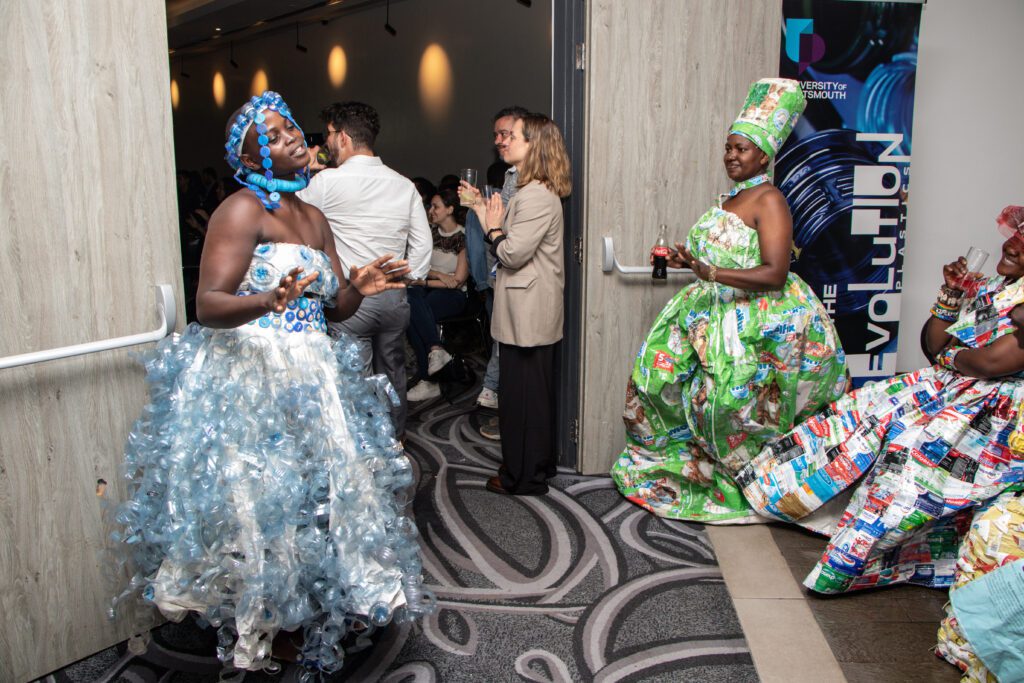
The waste pickers performed a powerful anthem, highlighting the systemic change that they would like to see included in the Treaty. Members of the Mukuru Youth Initiative performed two songs live – Ni Wajibu and Jita La Taka – both outputs of previous research collaborations with Revolution Plastics.
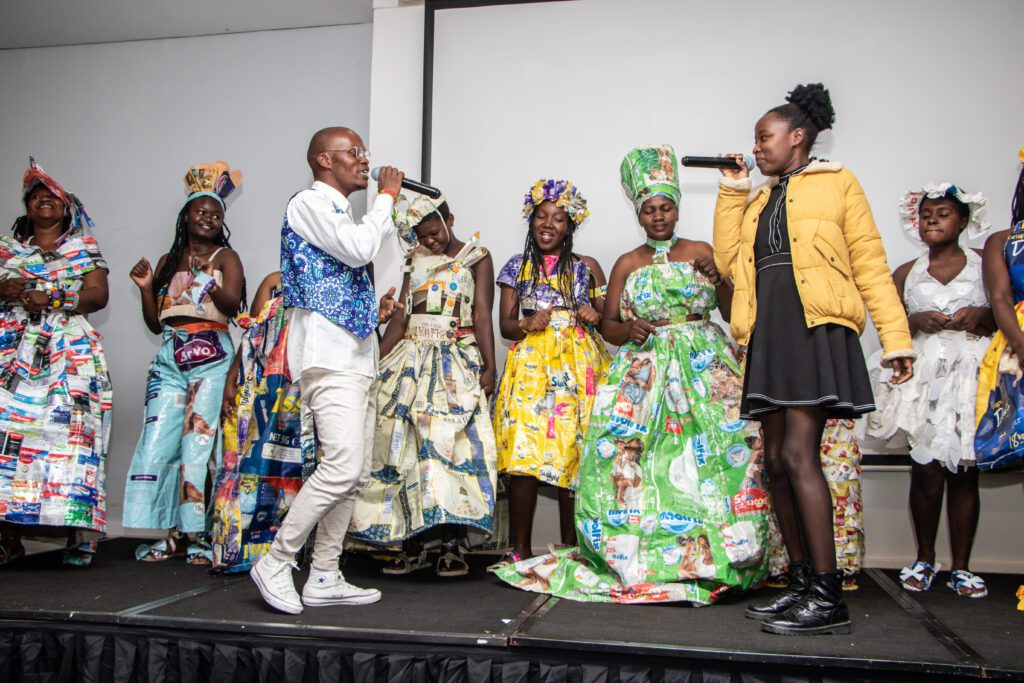
Waste picker and poet Anthony (find him on Instagram: @dcdomochafu) delivered a powerful spoken word to describe his life and experience as a waste picker:
PARTNERING OF CONVENIENCE FOR LIVING IN HARMONY WITH NATURE
From Gioto Nakuru to Nairobi’s Dandora, All that could be seen were lives full of horror, From Kisumu’s Kasese to Kitale’s Tuwami, For you to know more please be all ears on me, Was it actually a bed of roses or just roses on a bed? Hard to tell for all I had then was a brimful head, Living but seemingly left for the dead, Others meant to enjoy the fruits of the sweat I bled, For us to make an omelette we have to break some eggs, Pounce on the opportunity when possibility begs, To predict and be part of the future we have to invent it, Dream of it, talk of it, implement it, Out of the mental rot we got and came up with new thoughts, Despite anything, these thoughts were to be bought, Not one, not two, not three but we did a lot, And managed to come up with the best size for our fashionable coat, Out of our ways we went to make efforts pay, Efforts of friends whom if allowed to call names I may, I only had a title, waste picker. But since we met I’ve gathered some swag and ego, Why not say thank you to the likes of; Grid Arendal, Seed Fund, University of Portsmouth, CEJAD and WIEGO, Thank you, thank you, thank you to you too, You who despite the critics does what he or she has to do, With the challenges and controversies you’ve remained the ultimate you, My big family of waste pickers, I’m much grateful to you, Fortunately born was an association, Made of people with the same mission, Similar objectives to meditate on, Which eventually drew us from the land of the unknown to be known, We are the truth to be hidden, no, the lie to be spoken, Wishes of the living, no, prayers of some fallen, The chosen, I mean the begotten, KeNaWPWA, a bearer of Waste Pickers Power token, Presidented by none other than Mr. John. Reminding us from his story that good days come after the bad are gone, Working on ensuring that one day we be putting on the evening smile at dawn, Through the thorns this seed may stand grown. It was a plus for waste pickers to be represented at the international plastic treaty, Unlike the past local conventions which we were invited out of pity, Not for our grievances to be heard but just to be seen, And funnily during the conventions expected to be the most keen, Thank you for the appreciation of our integral role, It brought about a certain kick that transformed us from the Sauls to Pauls, For the first time we’ve gone from hearing to feeling the call, So for the whole present team, let’s make it an environment never dreamt but meant for all, This is a beast we can kill let’s join hands in the hunt, Remember slow progress and careful accumulation of ideas allows us do things thought we couldn’t, The time is here, when to know our ultimate measure, Let us develop a deep, driving desire to master the principles of living in harmony with nature, We do not have a choice but to Break Free From Plastics, We do have a voice over this after putting together the logics and tactics, Partnering with organisations like the University of Portsmouth and Global Alliance for Incineration Alternatives, Has indeed made us the best dish with perfectly chosen additives. So, are you ready to feast? LET'S FEAST.
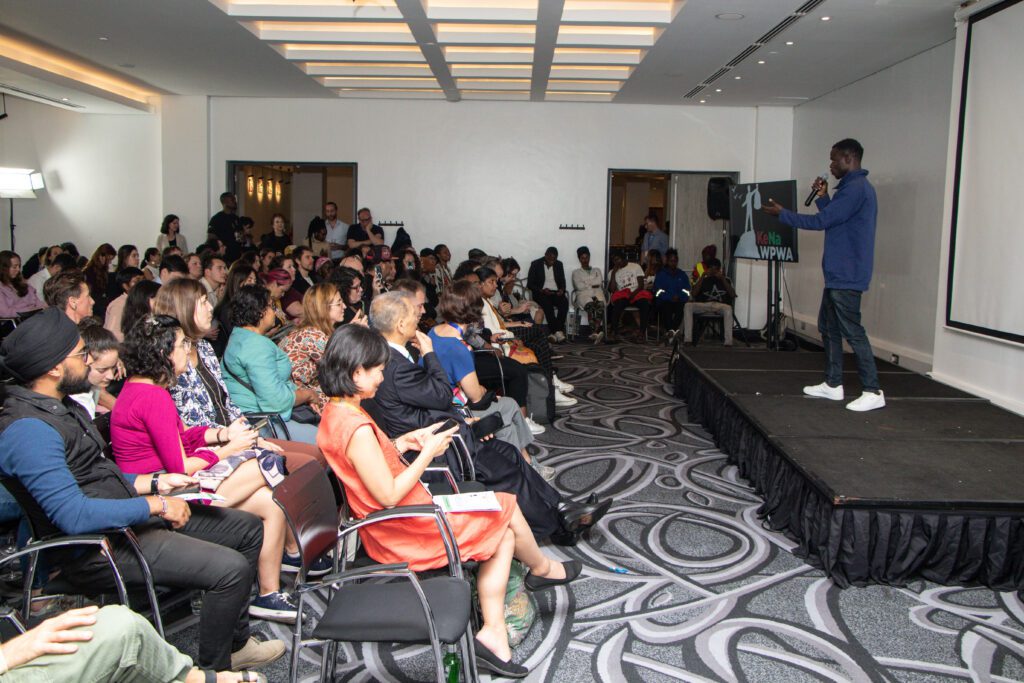
Acknowledgements
The project was funded by Grid-Arendal and Revolution Plastics, and the performances were further supported by the International Union for the Conservation of Nature and the Norwegian Agency for Development Cooperation.
Special thanks to the Social Justice Travelling Theatre for co-directing and co-facilitating, and bringing complex topics to life.
John Chweya and the Kenyan Waste Pickers Welfare Association had a significant role to play in organising the theatre, bringing together the waste pickers and bringing essential observers and delegates to the performances.
Lastly, these performances would not have happened without the vision, planning and direction of Matthew Hahn, Dr Erika Hughes and Dr Cressida Bowyer.